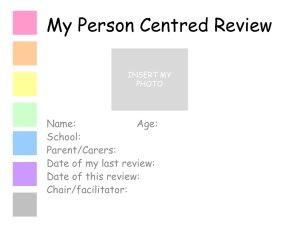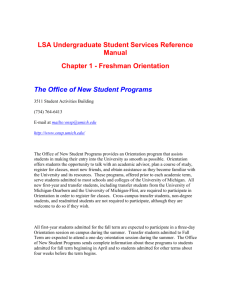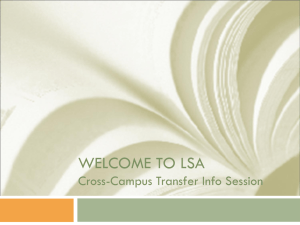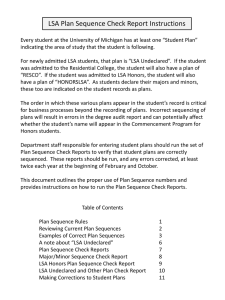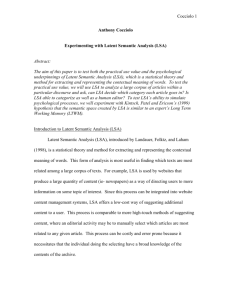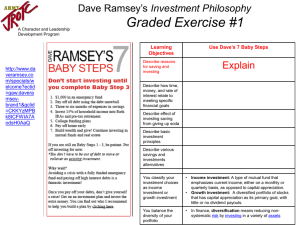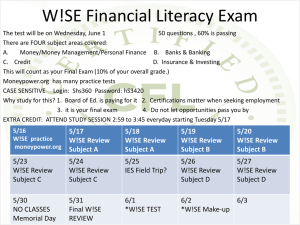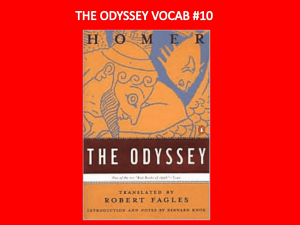Slides
advertisement
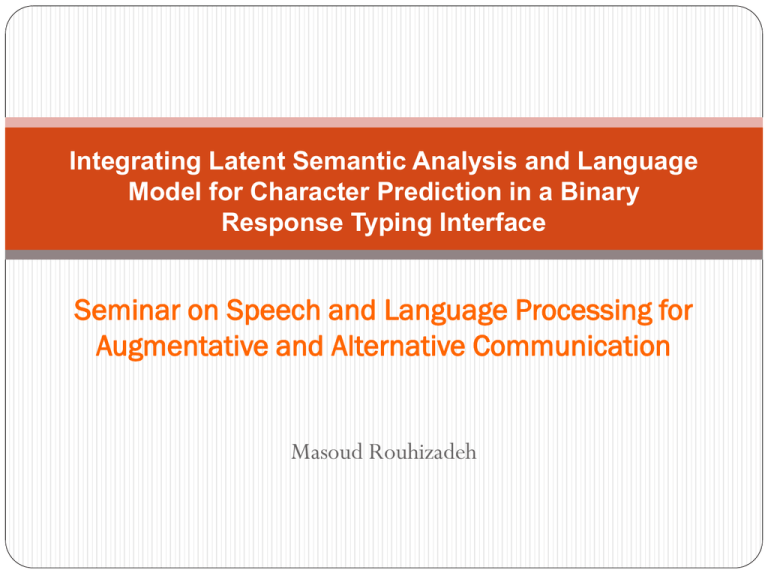
Integrating Latent Semantic Analysis and Language Model for Character Prediction in a Binary Response Typing Interface Seminar on Speech and Language Processing for Augmentative and Alternative Communication Masoud Rouhizadeh Introduction Most of the word or character prediction systems make use of word-based and/or character-based n-gram language models. Some works for enriching such language models with further syntactic or semantic information. (Wandmacher et al. 2007 & 2008). Predictive powers of Latent Semantic Analysis (LSA) for character prediction in a typing interface developed by Brian Roark (Roark 2009) Roark's binary switch typing interface Binary-switch Static/dynamic grid Different language model contributions Different scanning modes: Row-Column RSVP Huffman Latent Semantic Analysis (LSA) A technique to model semantic similarity based on co- occurrence distributions of words LSA is able to relate coherent contexts to specific content words Good at predicting the occurrence of a content word in the presence of other thematically related terms LSA, an example of documents 1. The Neatest Little Guide to Stock Market Investing 2. Investing For Dummies, 4th Edition 3. The Little Book of Common Sense Investing: The Only Way to Guarantee Your Fair Share of Stock Market Returns 4. The Little Book of Value Investing 5. Value Investing: From Graham to Buffett and Beyond 6. Rich Dad's Guide to Investing: What the Rich Invest in, That the Poor and the Middle Class Do Not! 7. Investing in Real Estate, 5th Edition 8. Stock Investing For Dummies 9. Rich Dad's Advisors: The ABC's of Real Estate Investing: The Secrets of Finding Hidden Profits Most Investors Miss Preprocessing and tokenizing Tokenizing Removing ignored characters Turning everything into lowercase Removing stop words Term by documents matrix Cosine similarity Each word is represented as a vector A[0, 0, 1, 1, 0, 0, 0, 0, 0]) B[1, 0, 1, 0, 0, 0, 0, 1, 0]) 0.4082 Integrating LSA and language model LSA is a bag of words model and is shown to be reliable to predict a word within a context Making it more sensitive to context Pa is estimated by cosine similarity of w1 w2 Pb is estimated by bigram probability of w1 w2 P(w2|w1) = λPa + (1-λ)Pb From word to character prediction In Roark's typing interface we are interested to predict characters, rather than words. Sorting the upcoming words based on their probabilities Evaluated by RSVP simulation From word to character prediction computer association accessories arts architecture ... bags backup backpack batteries backgrounds brands ... _, e, a, i, c, f, o, n, d, g, ,, t, r, h, m, ., ", s, l, p, b, -, u, "", w, k, j, q , $, y, v, x, z, :, ; B From word to character prediction computer bags backup backpack batteries backgrounds brands brain ... a, r, e, a, i, c, f, .... A From word to character prediction computer bags backup backpack batteries backgrounds ... c, g, t, e, a, i, c,.... C From word to character prediction computer backup backpack backgrounds ... k, a, e, a, i, c, f, … K From word to character prediction computer backup backpack backgrounds ... g, p, u, e, a, i, c, f… U From word to character prediction backup p, e, a, I, c, f, .... computer P Evaluation Simulation mode Trained and tested on a small part of NY Times portion of the English Gigaword corpus RSVP Results 2400 2200 2000 Average key-stroke per sentence 1800 1600 1400 1200 1000 Character frequency scanning LSA+Bigram Model 17.79 % keystroke-saving per sentence Conclusion Word-based language models shown to be effective in character prediction Integration of LSA and bigram language model works well in predicting upcoming words With larger LSA and bigram models we expect better results Thank you.
